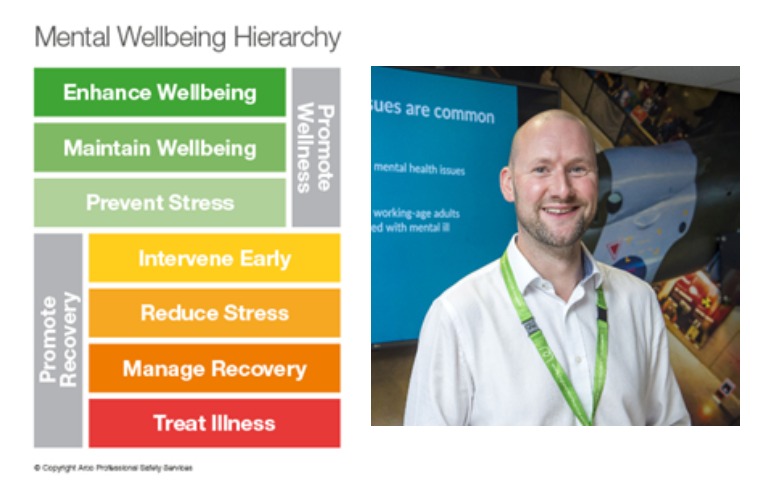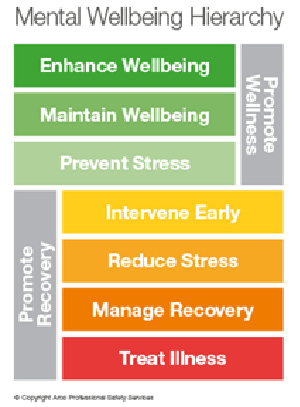The business
The ‘Hierarchy of Controls’ is an approach to risk reduction that has become entrenched in the Occupational Health and Safety (OHS) sector. It aims to provide a consistent structure for managing safety, ensuring effective control measures are put in place to eliminate or reduce workplace hazards. However, mental wellbeing is one of the only areas of health and safety where the 'hierarchy of control' does not apply. At Arco Professional Safety Services, we have developed an alternative hierarchy that better suits the aims, problems and solutions in this critical area. Key principles include:
- Prevention is better than cure. Recovery takes far longer than prevention and the costs to individuals' livelihoods and businesses are far greater.
- Failing to maintain health and wellbeing increases the likelihood of poorer mental health.
- Enhancing and maintaining overall health and wellbeing increases the likelihood of better mental health.
The managers
How much stress a team faces is dependent on factors such as resource availability, workload, corporate culture and the strength of their support system. Managers are ideally placed to help handle employee stress as they have a greater understanding of the people in their team, their roles and the stress risk factors. In as little as one day, we can help managers acquire the knowledge and confidence to manage mental wellbeing proactively. We recommend a ten-point action plan that can help managers support their teams more effectively. Key actions include:
- Carry out Stress Risk Assessments based on the Health & Safety Executive’s (HSE) Stress Management Standards (HSG218) to establish and resolve the causes of stress in the workplace and use the HSE’s ‘Talking Toolkit’ to engage with individuals about the topic and make reasonable adjustments.
- For non-work-related stress, managers can use a coaching approach (ask rather than tell) to help employees identify what is causing their stress, why it’s stressful to them, how they can tackle it and where they can go for help and support.
- Managers can encourage employees to complete a Wellness Action Plan (WAP), which can be used to promote wellness in already healthy employees and help those suffering or returning from a mental ill-health absence.
The individuals
There are many ways for individuals to manage stress, from guided breathing to decrease stress hormones and lower blood pressure, to understanding the importance of positive psychology. We teach recognised models such as PERMA as part of our mental health training courses to help achieve positive mental wellbeing. PERMA can help increase wellbeing by encouraging individuals to focus on living meaningfully, establishing supportive relationships, accomplishing goals and being fully engaged with life. Another key aspect of positive psychology is resilience, defined as the ability to cope with and recover from adversity.
Individual resilience will differ from person to person and throughout a person’s lifetime. It is not a fixed trait; it can be taught and developed over time with experience. Dr Lucy Hone, researcher and resilience expert, outlines three key traits of resilient people:
Resilient people understand that bad things happen to everyone - Every life will come with ups and downs and understanding this is critical to a balanced response to fortune and tragedy
Resilient people can focus their attention skilfully - Being able to view a situation ‘as-it-is but not worse than it is,’ is a vital skill for resilience and mental wellbeing. In addition to the things that may not be going so well, individuals can focus their attention on extracting the positives, otherwise termed as ‘benefit finding’. We recommend individuals ask themselves, ‘what has gone well today and what is still right with me, others and the world?’
Resilient people ask if what they are doing is ‘helping or harming?’ - We encourage individuals to identify their unhelpful thoughts, self-talk and behaviours and choose more helpful, realistic and empowering alternatives
Ultimately, mental health is not only a major issue in the workplace, but a major opportunity to take stock and ensure we are doing everything we can to protect the wellbeing of our colleagues. Five years ago, a near-tragedy cemented my belief that with the right support in place, positive mental health and wellbeing can be achieved and sustained.
Call: 0330 390 0822
Email: info@arcoservices.co.uk
www.arcoservices.co.uk/training/course-finder




































